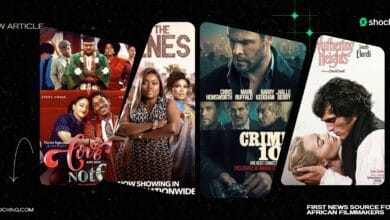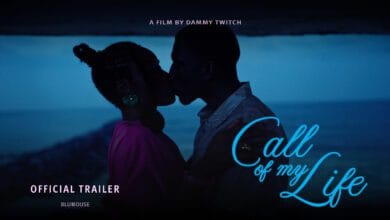The Story ⚡
In this exclusive interview, we sit down with Adeniyi Joseph-Omobulejo, known as TAJ, a dynamic Nigerian filmmaker, director of photography, and post-production studio owner, whose latest projects, Landline on Prime Video and Makemation, hitting cinemas this April and are making waves nationwide.
With a passion for inspirational storytelling and technical excellence, TAJ shares insights into his creative process, what drives his craft and how he aims to impact Nigerian and nationwide cinema with reflective, conscious, and inspiring stories.
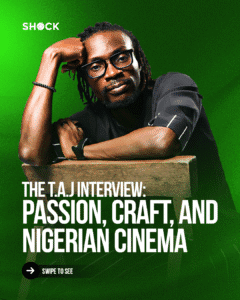
With “Landline” on Prime Video and “Makemation” in cinemas this April, how do you feel about these milestone releases?
As expected, I am excited that people get to see my work globally but most essentially, I am pleased at the kind of stories that I helped make work. I love inspirational stories and that’s what Makemation is and then Landline had me and Dele Doherty the director flexing our technical skills which was also fun to do. I just smile at the fact that people get to experience a bit of TAJ through these films.
How do the creative and technical approaches differ between “Landline” and “Makemation”?
Both films were actually technically challenging because Makemation is an AI-themed film and Landline is a psychological thriller, both of which I had never really done before but my job as the director of photography was to visually present the story succinctly. Makemation needed to feel inspiring, Landline needed to keep you confined in a loop with the character, and so the creative choices to make that happen were custom to the feelings we needed to evoke.
What inspired you to tackle diverse genres in “Landline” (drama) and “Makemation” (drama and tech), and are you drawn to specific themes or styles?
Oh, I am very drawn to inspirational pieces, my vision is to make the most reflective, conscious and inspiring films and if you take a look at my filmography, you will find a bit of of these but most of all, you will find inspiration. So Landline and Makemation presented some of these elements and I was glad to be invited to make those stories work
As a director, DOP, and post-production studio owner, how do you balance creative vision with technical execution?
As a man who wears many hats, I know that film is not made in isolation and that’s the reason it takes a village to make a film. Creative vision and technical execution are two different stages of the filmmaking process, you must have a vision that needs to be executed and in execution is when you bring in the professionals.
Balancing both processes is understanding that one cannot survive without the other so while I have great vision, I also understand the need to be able to speak the right film grammar in execution so that our message is not lost in transit.
What are the most essential skills for a filmmaker to master?
You definitely must master technical skills, but don’t be carried away by it, soft skills are very essential to thrive in the industry but the most important skill is storytelling skills and while you may have heard that everyone has a story to tell, I don’t believe everyone is a storyteller because it’s not everyone that knows how to tell a story, but storyteller skills can be learnt.
A combination of soft skills and storytelling skills, will make you a master at anything.
How do you develop a project like “AJA,” your upcoming dark thriller, and build tension and atmosphere in storytelling?
Aja is a different film from anything I have ever done as a film director.
My lovely writer, Producer and friend Titi Orire did a great job in creating a world that even I, as the director, was initially scared to step into, but that’s the point of art, it takes you into places you don’t think you have the heart for until you get there. The world of Aja cannot be explained; it only needs to be experienced, and you will soon when Aja is released globally.
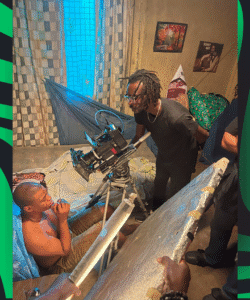
How do you foster collaboration on set, and what qualities do you value in your team?
Collaboration is everything you do in film because film is the only art you cannot do alone, and again, that’s where soft skills come in. In my team, I look for people who don’t just follow instructions, people who ask why and then take initiative. Nobody in production wants a liability in the form of a person.
How do you prioritize responsibilities and manage time across your multifaceted roles?
My different roles have their own time and they never overlap. When I am a DP, I am conscious that I am in service of the director, when I am a Director, I am in service of the story. When I am editing, I am in service of everyone, Director, DP but especially story. I think the secret is just realizing what role I am playing per time and playing it well. I am able to compartmentalize, maybe that comes from being a firstborn and then married.
What challenges have you faced in the Nigerian film industry, and how can filmmakers collaborate to address them?
There are quite a number of challenges, and I think we can fix them as we go, especially on an individual level, because we don’t have any union as an industry that will fight your individual cause; you are on your own. Everyone is carrying their cross.
Recently, I thought, if you were deprived of your due credit in a film, which union would you run to?
What’s the process of addressing that, you are just going to have to keep quiet, especially if you are a smaller fish. The industry is for elephants, and so everyone is doing everything to become one, the ants are the victims without anyone coming to save you.
The way out, be an elephant? The way out is a structured industry that has regulations, an industry is a body of professionals with common goals, what’s our common goals as Nollywood practitioners, my memory fails me now.
Everyone is an indie filmmaker doing indie things and letting the supposed industry figure itself out.
How do you stay updated on industry trends and technology, and which tools or techniques excite you for future projects?
About staying updated, that’s where we have Shock, Nollywire, and a lot more platforms are creating news about the industry for us, which is great. I am excited about the future because of the many opportunities that God is bringing my way and the way of my friends. I want to learn as much as possible, and growth will follow suit.
What lessons from “Landline” and “Makemation” will shape your approach to “AJA” or future work?
Makemation, Landline, Aja and any other work I am going to do are never going to be the same.
Those have been done, and I am moving on from them, but they have proven me right against my ignorant judgment that I have the capacity to tell impactful stories. About lessons, Life constantly influences me and those influences find expression in my work. So I just need to live more and pray that God orders my steps to the influences that will change my life.
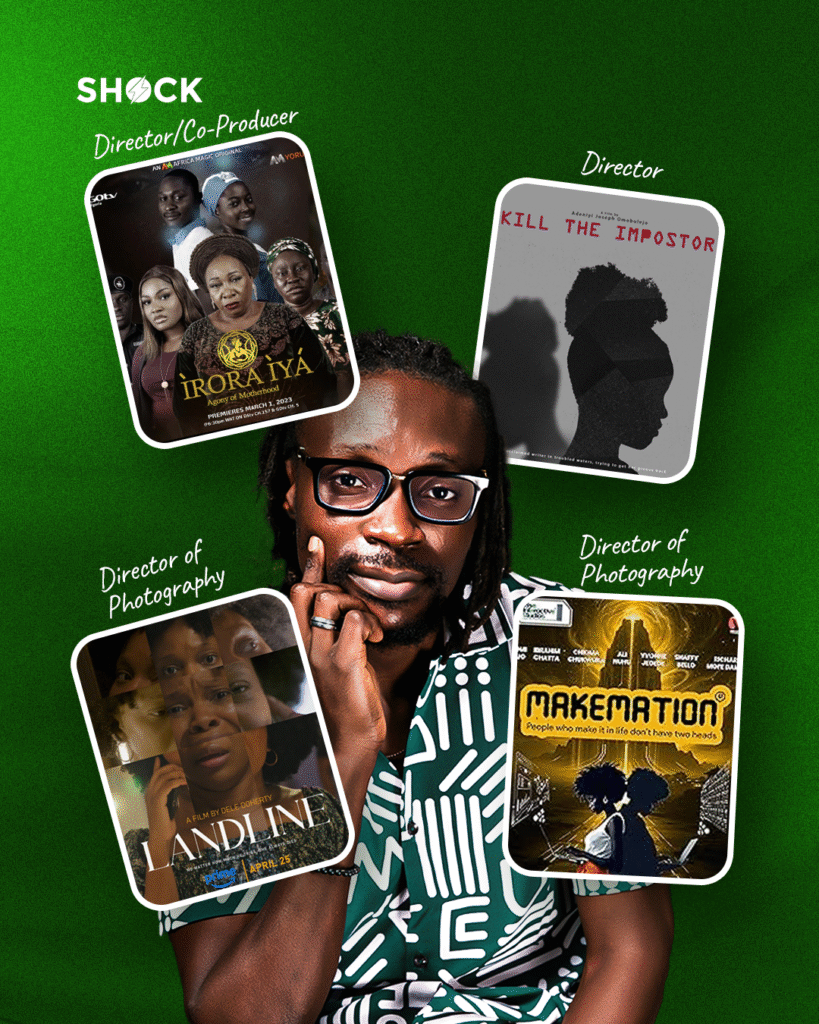
How do you build and maintain relationships with cast, crew, and collaborators, and what makes a great collaborator?
Cast and crew are professionals who have different roles to play on any project, and our relationship is that, professionals and so we must act like one. While we may be friends, the primary reason we are here right now is to make this film and we are all in service of the story. I encourage you to let love lead, and I say that at some point, I hope that you experience TAJ.
What advice would you give emerging Nigerian filmmakers, and what resources or support systems would help them most?
Build your soft skills alongside your technical skills. Your technical skills will get you the job, but your soft skills will keep you on the job.
There are very many badly behaved but talented people who are frustrated for not working; what they fail to realize is, it’s not their talent that’s the problem, they have become a problem for their talent. No one wants to work with you because you are problematic, check yourself.
Looking ahead to “AJA” and beyond, what themes or stories are you passionate about, and how do you see your work impacting Nigerian and global cinema?
I hope that you can watch my work and genuinely say ‘TAJ, thank you’. That’s like the best compliment and fulfilment I can get for making films. I want to be a part of your life through my work, but a part that lets you reflect and reminds you to be better.
What’s one technique you use to continually improve your filmmaking craft?
I look forward to working with other people so I can learn from them. When I am a DP, I learn from the Director and vice versa. Of course, I watch YouTube and take courses. I am looking to attend labs to enhance my storytelling skills.
What do you do for fun when you’re not working?
I play football when I can. I watch movies.
My wife always has gist for me. I love to have the people I love around. I love Christmas. My wife’s jollof makes me happy.
How has your Nigerian heritage influenced your storytelling and creative choices across your projects?
You know what I said about how life influences me.
Being a Nigerian is a part of that, and everyone is a sum total of their influence and where they are from. I think Nigeria prepares you for the worst, and if you can thrive in Nigeria, that means you’re certified to thrive anywhere else in the world. While being a Nigerian could make one tenacious, it also could make one’s mindset very limited, as this is the only world you know, and that’s why we mostly make films for ourselves, but that’s changing.
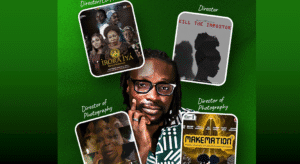
Thanks for Reading.
Shockng.com covers the big creators and players in the African film/TV industry and how they do business.
Let’s be friends on Instagram @Shockng
